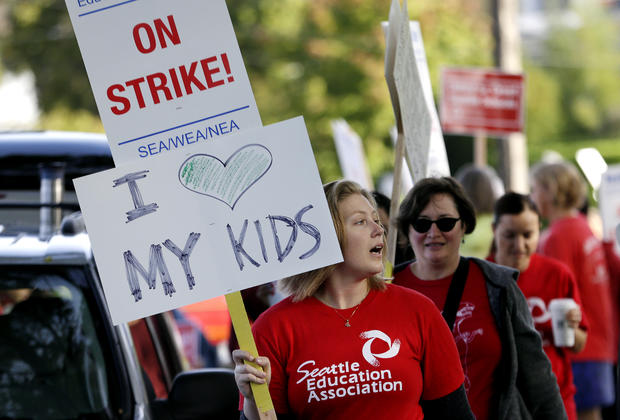Seattle teacher strike sends parents scrambling for child care
SEATTLE - The city opened more of its community centers Monday to help Seattle parents who were scrambling for child care as a teacher strike entered its fourth day. Several of the centers quickly filled, forcing them to turn families away.
Seattle Parks and Recreation spokesman David Takami said 21 community centers are taking care of some 2,000 children in kindergarten through sixth grade free of cost, and that number is rising. Many of the centers are at capacity, and the effort is costing the city about $21,000 a day, he said.
"It's pretty much been an early-morning mad dash for kids to get into camp," said Jason Busbee, a front-desk coordinator at the Queen Anne Community Center.
Busbee described the atmosphere as "one big party," with volunteers helping oversee activities that included kickball, foosball and lawn darts. The center even ordered bouncy houses.
The strike, over issues that include pay raises and the length of the school day, has delayed the start of the public school year for about 53,000 students. Many teachers in Washington state's largest school district say they have gone six years without a cost-of-living raise, making it difficult to live in Seattle, where expenses have been rising in part from the influx of highly paid tech workers.
Seattle Public Schools provided raises totaling 8 percent out of local levy money in that time.
The sides resumed negotiations this past weekend, and parents were staying flexible while they wait for a deal. Kim Flanery-Rye had to bring her 7-year-old son to work one day and had his uncle watch him another. Her husband worked from home the third.
"This is really a great way to make sure our children are taken care of," said Kim Flanery-Rye, who dropped her son Monday at Miller Community Center.
Last week, the parks department expanded its before- and after-school programs to all-day care at 16 community centers, with capacity for just under 900 students. This week, Mayor Ed Murray directed the department to bring in additional volunteers and staff, bringing the total capacity to 3,000.
As tough as the strike has been on parents who were counting on having their kids in school, many still support the teachers.
"It's inconvenient, but not as inconvenient as not getting a raise," Mark Oberlander said Monday as he dropped off his son, a first-grader, at a Boys & Girls Club. "It's very expensive to live in Seattle. I don't want all the teachers commuting 45 minutes in."
Alexander Rakitzis, a junior at Garfield High School, said he would be annoyed to still be in school in late June to make up for the strike, but that the teachers deserve more.
"Last year, we ran out of paper," he said. "The paper budget was gone and teachers couldn't print stuff anymore. They don't have enough money."
Teacher salaries in Seattle range from about $44,000 to more than $86,000, depending on experience and degrees.
This weekend, the union made a counterproposal on salary that called for raises totaling 9.75 percent over two years - far less than the 21 percent over three years it initially sought.
"We want to get kids back in school, and we want to show good faith," Seattle Education Association Vice President Phyllis Campano said Sunday evening.
The district will consider shortening holiday breaks or adding days at the end of the school year because of the strike, which began Sept. 9, Seattle Public Schools spokeswoman Stacy Howard said.
CBS Seattle affiliate KIRO reports the school district says the strike is costing them roughly $100,000 for each day missed, but they have not broken down how they arrived at that number. The teachers' union says they're curious what the expenses are when teachers aren't being paid, according to the station.
This year, lawmakers - facing a court order to increase spending on education - came up with money for new teachers and supplies. Some $37 million of that money is going to Seattle. The district says it has offered raises totaling 14 percent over three years, but it also wants to extend the school day by 20 minutes, arguing that Seattle has one of the shortest instructional days in the state, at 6 hours and 10 minutes.
The Seattle Education Association said the proposal would have forced teachers to work that extra time for free. Over the weekend, the district offered to pay teachers for the added instructional minutes, Howard said. Neither the district nor the union released details on how much the additional pay would amount to, but the union said it was "not enough."
